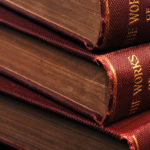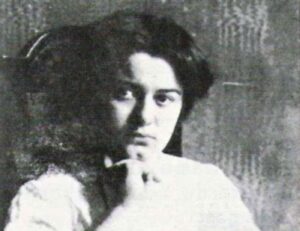Elayne Allen, Public Discourse’s outgoing managing editor, is filling in for Matthew J. Franck’s August Bookshelf. The column will return to its rightful author in September.
Last month in The Atlantic, Sam Apple wrote an essay, “Tolstoy and Chill,” about audiobooks’ recent uptick in popularity. He considers how listening to a book changes the way we experience it: audiobooks are more passive and relaxed than reading a physical book. This passivity, he notes, means that audiobooks just aren’t conducive to deep reading and “critical reflection.” Apple’s fascinating argument is that audiobooks’ more chill approach to reading is actually a good thing, not something to shun as unserious or lazy.
Apple’s insights point to deeper truths about novels as a genre, and the misguided ways we sometimes approach them. Reading, especially works of fiction, is supposed to be an activity of leisure. Instead, it has become laborious for many people thanks to a variety of causes, such as the influx of digital technology. By making the reading process lower-effort and lower-key, audiobooks can help recover the leisurely spirit in which novels are meant to be read.
Novels and Leisure
Start your day with Public Discourse
Sign up and get our daily essays sent straight to your inbox.If one approaches a novel as something painful and toilsome, one isn’t approaching it properly. Novels are meant to please us in some way, even when they disturb or unsettle us. In his 1948 book Leisure: The Basis of Culture, the philosopher Josef Pieper observes that the “soul of leisure” is celebration, in which three things converge: “effortlessness, calm and relaxation, and its superiority to all and every function.” A novel is an art form whose meaning can’t be exhausted by rational analysis or laborious interpretive effort. A novel invites us to temporarily relax the motion of our minds, and delight in its presentation of reality, even when it’s tragic.
But many of us have difficulty experiencing books in this way. For some, reading has unfortunately become a chore, an uphill battle against various digital distractions. Constant connectivity can clutter our waking hours with endless tasks (pay this bill; submit this application; renew this subscription; and on they go). This can make all our activities seem like a box to check on a to-do list—including our reading time.
A novel invites us to temporarily relax the motion of our minds, and delight in its presentation of reality, even when it’s tragic.
And sometimes reading a book should be work. A manual, or self-help book, for example, is read in order to achieve a specific outcome. Reading a book to write an academic article is scholarly work. In all these cases, the purpose of reading the book is external to the reading itself. But if we always read novels this way, as a kind of labor, we risk losing their essence. Pieper’s description of workism suggests that this way of reading ascribes too much credit to ourselves: “man seems to mistrust everything that is effortless; he can only enjoy, with a good conscience, what he has acquired with toil and trouble; he refuses to have anything as a gift.” This attitude describes what many think is the only responsible approach to great literature: furrowed brow, strained effort, a great feat of mental strength.
Some novels are rather challenging; I am reluctant to crack open any of James Joyce’s works for this reason. Novels like Joyce’s require practice and study before they can be enjoyed. Pieper acknowledges this: “The highest forms of knowledge … may well be preceded by a great effort of thought.” Toil, effort, and struggle create the conditions for us to receive the rewards of great literary tomes. Still, these are preparations for reading, not the reading itself. It’s all too easy to view reading a novel as a heroic feat of the will, to think great literature is something that must be violently wrestled with.
But this approach is incongruous with the novel’s form, which is a delicate balance of various parts. These blended ingredients can’t be disaggregated and scrutinized without losing something of the whole. Novels are best approached on a semiconscious level, as Apple points out in his essay. Apple adds: “Susan Sontag described ‘interpretation’ as ‘the revenge of the intellect upon art.’” Highly formalized analysis injures the book’s integrity.
This more dormant posture, with the active mind at rest, allows the novel’s elusive core to come into view.
Reading novels in the spirit of leisure I described above—relaxed, receptive—accords with the novel’s form. This kind of reading isn’t mindless, and it cannot be equated with mere consumption, passivity, or amusement. Rather, leisure is about adopting the correct orientation toward reality. It is grounded in humanity’s status as recipients of life and grace. Pieper writes: “[E]verything gained and everything claimed follows upon something given, and comes after something gratuitous and unearned … everything in the beginning is always a gift.” We ought to receive a novel as a gift, a glance into the patterns of a great mind, as Apple suggests. This more dormant posture, with the active mind at rest, allows the novel’s elusive core to come into view.
The Potential of Audiobooks
Listening to novels can help us adopt a more leisured pace of reading amid the frantic pace of modern life. When reading a book that’s in your hand, it feels like your possession. You can underline, reread, dog-ear it, write marginalia, look up a word you don’t know, and pause for thinking. These things are harmless in themselves, and they are essential tools for scholarly work. But marking up a book can create a sense that it’s an idea to be conquered rather than a companion whose company you delight in.
Perhaps some of us who studied the humanities in college are stuck in academic approaches to reading novels. Maybe we don’t read as much as we would because we feel like we have to read the way we did to prepare for a seminar or write a term paper. This academic approach can lead us to dismember a book—analyze the plot, themes, characters, language—or as Apple says, the book ends up “stripped for parts” rather than enjoyed.
The pleasure of book-listening stems not just from the lack of exertion, but also from the more raw encounter that brings the novel into fuller view.
An audiobook, meanwhile, simply marches on at its own pace. This leaves less room for careful dissection, but, as Apple argues, provides “a more relaxing and pleasurable experience.” The pleasure of book-listening stems not just from the lack of exertion, but also from the more raw encounter that brings the novel into fuller view.
This raw experience is perfectly achievable by reading a novel. I still read more novels than I listen to. But when I get swept up in the demands of work, mothering, or life’s many administrative tasks, audiobooks are often a powerful antidote to restlessness.
Let me conclude by recommending a few audiobooks to those who want to give it a try. Admittedly, you’re at the mercy of a narrator when you listen to an audiobook, so you must choose wisely. Jeremy Irons’s reading of Evelyn Waugh’s Brideshead Revisited is glorious, and listening to it truly effortless. Richard Poe’s narration of East of Eden is also captivating, providing a lively experience of the book. Arguably, though, the best audiobooks are read by their own authors. Right now, I am listening to Donna Tartt’s narration of her 1992 novel, The Secret History, a disturbing and illuminating story of a group of college students whose enthusiasm for ancient Greece becomes treacherous. Tartt’s reading brings life to the characters, capturing subtle inflections that other narrators probably would’ve missed.
The advantages of audiobooks are manifold. Apple is right that audiobooks can bring more fun to a novel, while also being low-effort and practical. They can be listened to while completing mundane tasks, in the car, on a walk or run. But for all their conveniences, I think audiobooks’ greatest merit is to encourage a sense of receptivity and leisure throughout the rest of life, not just one’s reading life. Listening to a novel, accepting its rhythms and flow of detail on the book’s own terms, is a gentle reminder that life’s most glorious things demand quiet, silent admiration, and loving acceptance.













